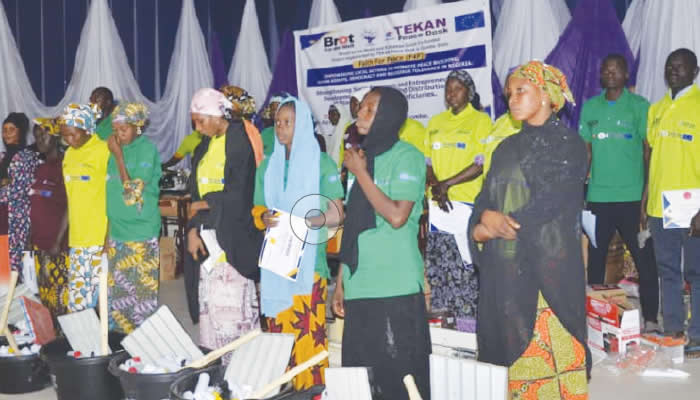The Strengthening Socio-Economic and Entrepreneurial Development group, supported by the Faith for Peace project, a joint initiative of Bread for the World and the European Union and implemented by TEKAN Peace Desk, has empowered at least 40 young people in Gombe State, Nigeria. This initiative aimed to equip these youths with vocational skills and provide them with the necessary resources to establish their own businesses, thereby improving their socioeconomic standing and contributing to the overall development of their communities. The beneficiaries, drawn from various local government areas including Billiri, Kalmai, Deba, Kunuwal, Malam Sidi, and Kwami, received training and start-up packs in a wide range of vocations. These included tailoring, carpentry, welding, barbing, hairdressing, knitting, cosmetology, make-up application, plumbing, and Plaster of Paris (POP) crafts. The project organizers emphasized the importance of utilizing these newly acquired skills and resources for personal and community growth.
The graduation ceremony and distribution of start-up packs marked a significant milestone for both the beneficiaries and the organizations involved. Mrs. Helen Philemon Haggai, coordinator of TEKAN Peace Desk, underscored the strategic nature of the program, highlighting the prevailing economic hardship in Nigeria and the critical need for individuals to acquire skills and resources to navigate these challenges. She emphasized that the training and start-up packs provided a solid foundation for the beneficiaries to build upon, enabling them to support themselves, their families, and their communities. The meticulous selection process, which prioritized women due to their recognized organizational skills, further underscored the program’s commitment to ensuring maximum impact and sustainability.
Haggai stressed the importance of treating the provided resources as investments rather than commodities to be sold. She urged the beneficiaries to leverage the skills and knowledge acquired to generate income, support their families, and educate their children. This long-term vision extends beyond individual empowerment, aiming to create a ripple effect of positive change within the beneficiaries’ families and communities. The emphasis on long-term utilization underscores the project’s commitment to fostering sustainable development and discouraging short-term gains that could jeopardize the overall objective of economic empowerment.
Reinforcing this message, Evans Leviticus, the TEKAN Peace Desk Secretary in Gombe State, echoed the importance of preserving and utilizing the donated items. He highlighted the significant investment and sacrifice that went into making the program possible, emphasizing the beneficiaries’ responsibility to use the resources for the betterment of their communities. This collective call to action underscores the shared responsibility of both the providers and the recipients in ensuring the program’s success and long-term impact. The emphasis on community benefit highlights the program’s broader goal of fostering social and economic development beyond individual gain.
Usman Danburam of Jama’atu Nasril Islam further solidified this message, comparing the donated items to retirement benefits, highlighting their potential for long-term financial security and improved livelihoods. This comparison underscored the transformative potential of the program and the importance of treating the resources with the foresight and prudence necessary to realize their full benefits. By framing the resources as a form of long-term investment, the organizers aimed to instill a sense of responsibility and ownership among the beneficiaries, encouraging them to make sustainable choices that would secure their future.
The beneficiaries expressed their profound gratitude for the empowerment initiative. Iliya Amos, speaking on behalf of the graduating class, acknowledged the transformative impact of the program, expressing a renewed sense of hope and empowerment. He pledged to utilize the acquired skills and resources effectively, promising to continue learning, train others, and contribute positively to their communities. This commitment to continuous learning and mentorship demonstrates the ripple effect envisioned by the program, highlighting the potential for the beneficiaries to become agents of change within their communities. The beneficiaries’ heartfelt expressions of gratitude and their commitment to maximizing the impact of the program served as a testament to the transformative power of well-designed empowerment initiatives.














